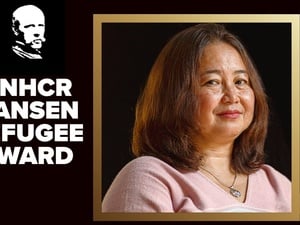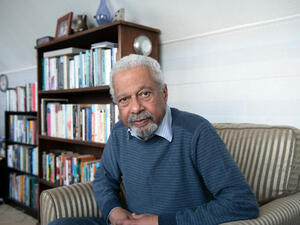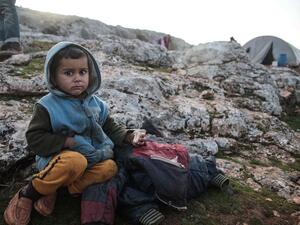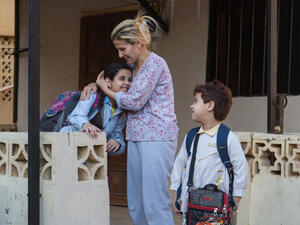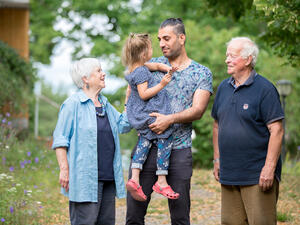UNHCR marks World AIDS Day with calls for more understanding, prevention and care
UNHCR marks World AIDS Day with calls for more understanding, prevention and care
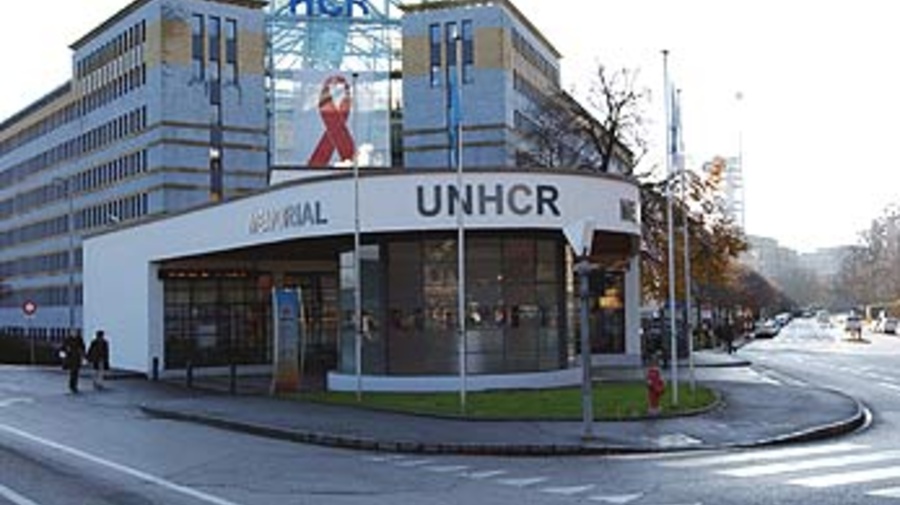
The UN refugee agency commemorates World AIDS Day 2002 at its headquarters in Geneva.
GENEVA, November 29 (UNHCR) - The UN refugee agency today observed World AIDS Day by calling for an end to the stigmatisation of HIV/AIDS-infected refugees while pledging to strengthen the prevention and treatment of the virus among refugee populations.
Marking the day at UNHCR's headquarters in Geneva, Assistant High Commissioner for Refugees Kamel Morjane reiterated the agency's commitment to fighting HIV/AIDS in refugee situations, calling it a "policy priority".
The slogan for this year's World AIDS Day, which falls on Sunday, is "Live and Let Live". The UNHCR ceremony featured video screenings on AIDS-related issues, as well as the sale of awareness-raising materials like UNHCR World AIDS Day T-shirts and beaded pins made by women from the Sinikithemba centre in Durban, South Africa.
A handbook, "AIDS and HIV Infection: Information for UN employees and their families", was distributed to the refugee agency's staff members, and a huge banner of a red ribbon was hung outside the UNHCR building to raise public awareness of the annual event.
According to a recent report by UNAIDS and the World Health Organisation, there are currently 42 million adults and children living with HIV/AIDS around the world. This year alone, 3.1 million people have died from it. It is the leading cause of death in sub-Saharan Africa and the fourth leading cause of death worldwide.
"The prevention of HIV/AIDS is an essential component of the overall protection of refugees and displaced people," notes UNHCR in its Strategic Plan for Refugees and HIV/AIDS, which covers the period from 2002 to 2004.
Refugees are particularly at risk of HIV infection as wars and conflicts often force them to flee to areas where the virus is prevalent. They are also exposed to factors which can facilitate transmission of the virus - poverty, disruption of family/social structures and health services, increase in sexual violence, and increase in socio-economic vulnerability, particularly of women and youth.
Speaking at the ceremony on Friday, Morjane cautioned, "We must combat any false notion that 'wherever they are, refugees bring AIDS with them to local communities' because this is simply not true. Such characterisation can result in discrimination - something we can never accept."
Under its strategic plan, UNHCR aims to make sure that refugees are not persecuted on the basis of their HIV infection, and that HIV testing is voluntary, with confidential notification of results. It also seeks to empower refugee women and girls through basic rights awareness training in order to reduce their vulnerability to the virus, and to ensure the protection of unaccompanied refugee children, with a special emphasis on preventing all forms of abuse, including sexual violence and sexual exploitation.
The refugee agency is also working to reduce HIV transmission and improve treatment and care by strengthening the planning, implementation, surveillance, monitoring and evaluation of HIV/AIDS programmes. By encouraging refugees to participate in all stages of such programmes, UNHCR hopes to empower them to take responsibility for protecting themselves against the virus.
"During the next decade, the HIV/AIDS pandemic could drastically impact UNHCR's work in the field," said Morjane. "If the disease keeps on spreading, particularly in certain parts of the world, there will be many more single-headed refugee families and orphans requiring care and support in our camps than there are today. Disposable income among refugees could also be affected - which means that they would be more, rather than less, dependent on external assistance. This, in turn, could potentially seriously undermine our policy to encourage self-sufficiency where possible."
Addressing the agency's staff, he added, "Trying to limit damage caused by HIV/AIDS among refugee populations will therefore remain a major challenge in the years ahead, both for UNHCR as an institution as well as for all of us."


